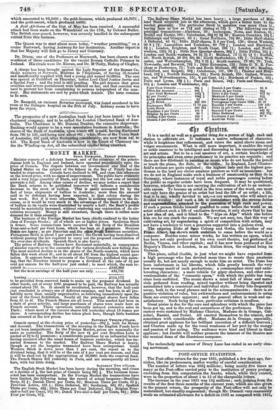Of Outing.
It is a useful as well as a graceful thing for a person of high rank and station to cultivate art. It indicates a native refinement of character, while it heightens that refinement, and raises the mind above mean and vulgar amusements. What is still more important, it enables the royal or noble amateur to be intelligent and discerning in his encouragement of art and artists. But to be a real amateur of art, a certain knowledge of its principles and even some proficiency in its practice are requisite ; and there are few dilettanti in painting or music who do not handle the pencil or touch the piano, the flute, or the violin. In England, Lord Chester- field's notions are quite exploded ; the highest lady and the highest gen- tleman in the land are clever amateur painters as well as musicians : but we do not in England make such a business of amateurship as they do in Germany, where instances of royal and noble personages coming before the public as regular artists have been frequent. It may be questioned, however, whether this is not carrying the cultivation of art to an undesir- able excess. To become an artist in the true sense of the word, one must not only have the genius of an artist but lead the life of an artist ; a life, that is to say, wholly devoted to art,—a coy mistress, who will admit no divided worship : and such a life is inconsistent with the serious duties and responsibilities attached to the possession of high rank and power. If such a person thinks himself qualified to come before the world as an artist without such a life of exclusive devotion, it only shows that he has a low idea of art, and is blind to the "Alps on Alps" which rise before him ere he can reach the summit. We are not sure, too, that this way of cultivating art, by engendering a spirit of competition with artists, may not have a tendency to turn a generous supporter into a jealous rival. The reigning Duke of Saxe Coburg and Gotha, the brother of our Prince Albert, has shown much ambition to come before the world as a composer. Besides some minor works, he has written an opera, which has been not only produced at his own court theatre, but performed at Berlin, Vienna, and other capitals ; and it has now been produced at Her Majesty's Theatre in London, in an Italian dress, the original being in German.
This piece, called Casilda, is just what we might have expected from a high personage who has devoted more time to music than amateurs usually do, but not nearly enough to make him an artist. The Duke has been unfortunate in his libretto, which falls greatly beneath the very low average merit of such productions; a commonplace story and unin- teresting characters ; a mere vehicle for gipsy choruses, and other con- ventionalisths of the "romantic opera," with which the public has long since been surfeited. The music shows a mind full of ideas and mate- rials gathered from reading, mixed together without being digested and assimilated into a consistent and individual style. Pretty bits frequently occur, both in the vocal phrases and in the accompaniments ; there is no positive violation of rules, but awkwardness and embarrassment in using them are everywhere apparent; and the general effect is weak and un- satisfactory. Such being the case, particular criticism is needless. Great praise is due for the care and splendour with which the piece has been got up, and to the zeal and earnestness of the performers. The cha- racters were sustained by Madame Charton, Madame de la Grange, Cal- zolari, Bassini, and Susini. All exerted themselves to the utmost, and sometimes with considerable effect. Madame de In Grange, especially, obtained great applause for her brilliant execution of a difficult bravura, and Charton made up for the vocal weakness of her part by the energy and passion of her acting. The audience were kind and liberal in their- applause ; but Casilda will neither promote the interest of the theatre nor the musical fame of the illustrious composer.


























 Previous page
Previous page